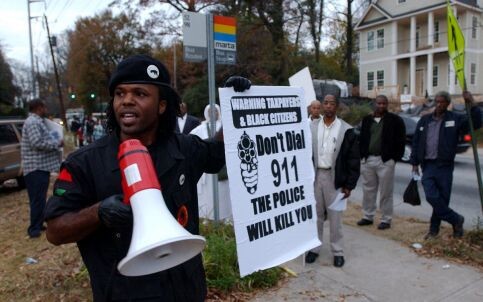The Electronic Intifada 7 April 2011

Activists protest in Atlanta after police killed 92-year-old Kathryn Johnston, November 2006. (W.A. Bridges Jr./Atlanta Journal-Constitution)
The racism of the American “war on drugs,” especially in the south, is notorious. So is the racism faced daily by Palestinians. In Atlanta, a university program allows these two manifestations of racism to feed off each other and community activists are organizing to shut the program down.
On the evening of 21 November 2006, the Atlanta Police Department’s recently disbanded Red Dog Unit killed Kathryn Johnston, a 92-year-old Black resident of the northwest Atlanta neighborhood of English Avenue. As she sat in her home watching television, several Atlanta policemen bashed in her front door to execute their fraudulently obtained “no-knock” search warrant. After firing 39 shots, the police officers handcuffed Johnston, placed a dime bag of marijuana on her corpse and vacated her home, leaving her to bleed to death there (Ernie Suggs, “City to Pay Slain Woman’s Family $4.9 million,” Atlanta Journal-Constitution, 16 August 2010).
Organizers with the Movement to End Israeli Apartheid-Georgia (MEIA-G) read a newspaper article about the court proceedings following Johnston’s brutal murder, stumbled upon a brief note about the Georgia International Law Enforcement Exchange (GILEE) and wondered what it was and how was it connected to Johnston’s death.
MEIA-G was established in February 2009 after an unprecedented mobilization in response to the 23-day-long Israeli assault on Gaza. Hundreds rallied in the streets of Atlanta in solidarity with the Palestinian people, vowing to organize to support them in their struggle for liberation. After launching MEIA-G, we endorsed the 2005 Palestinian call for boycott, divestment and sanctions and identified GILEE as our primary campaign target.
Housed in Georgia State University’s (GSU) Criminal Justice Department, GILEE is a police exchange program whereby high-ranking Georgia police officers travel to Israel to learn counter-terrorism tactics from the Israel national police. Conversely, Israeli police officials travel to Atlanta every two years to learn Georgia’s drug enforcement tactics such as those employed against Johnston, Tremaine Miller, Pierre George and countless other African-American victims of police abuse and aggression. Through GILEE, the Israeli police adopt these tactics and employ them on Palestinian citizens of Israel and Palestinians residing in the occupied West Bank.
While GILEE has relationships with several international police agencies, its relationship with the Israeli police is the most intimate and most troubling. Israel is one of the most brazen violators of human rights and international law in the world. Israeli police, in their execution of the racist and discriminatory policies of the Zionist government, have been and are a major source of these violations. MEIA-G hopes to keep the brutal police methods and tactics employed by the Israeli police from being adopted and implemented in Atlanta. To do this, MEIA-G seeks to expose and shift the practices of both the Atlanta and Israeli police by eliminating this exchange program, the aim of which is to proliferate repressive police tactics internationally.
Alongside 18 campaign endorsers and more than 1,200 individual supporters, the MEIA-G and GSU’s Progressive Student Alliance have built, cultivated and sustained a growing coalition organizing to eliminate GILEE from GSU and ultimately from Atlanta.
While the collaboration between the US military and the Israeli military is well-documented, social justice activists in the US are just now beginning to uncover the depth of collaboration between US and Israeli police forces. These collaborations further underscore the extent of the “special relationship” between the US and Israel, and their similar needs, as European settler-colonial projects, for elaborate systems of social control to manage the troublesome “undesirables” in their midst.
The US south has a particularly troublesome history of managing “undesirables.” With the formal abolition of slavery after the Civil War, a critical social question arose: how would the Georgia elite maintain its wealth and power in a society dependent on cash crops like “King Cotton” that relied upon a cheap, controllable and stable labor force? Policing provided the answer: newly established law targeting such activities as vagrancy and loitering were used to arrest and incarcerate southern Blacks. In short, prisons replaced plantations and police officers replaced plantation overseers (see Angela Davis, Abolition Democracy: Beyond Empire, Prisons and Torture, pp. 7-18).
Both the US and Israel are rooted in outside colonial forces invading a territory with the goal of possessing the maximum amount of natural resources — namely land — while erasing its indigenous population. In both cases, the US and Israeli militaries were created to engage the “external” threats of the unconquered indigenous populations, while their police forces were created to maintain control over the conquered indigenous populations (and other subjugated peoples like enslaved Africans) absorbed and “internalized” within these nation-state projects.
The US boasts the highest incarcerated population in the world — more than two million persons, including more than 800,000 Blacks. This does not include those on parole, on probation or unable to be employed because of a criminal record. Policing plays an integral role in not only surveiling, controlling and intimidating communities of color but also in funneling people into prisons. With such an exorbitant national incarceration rate, what do Georgia police officials like current Atlanta Police Department Chief of Police George Turner, former Chief of Police Richard Pennington and current Georgia Bureau of Investigation Director — all of whom have sojourned in Israel for the GILEE training — have left to learn about terrorizing and controlling these communities?
The Zionist project of confiscating the most amount of Palestinian land with the least amount of indigenous Palestinians remaining has one vital flaw. Evidenced in more than 60 years of resistance and resiliency to occupation, apartheid and genocide, Palestinians continue to resist the Zionist program of ethnic cleansing. Following the expulsion of 800,000 Palestinians in 1948, the Israeli state was tasked with controlling that pesky, residual population throughout historic Palestine. Under the guise of counter-terrorism, it is the Israelis’ sophisticated social control mechanisms that Georgia police officials learn to inflict upon Georgia residents.
The Georgia International Law Enforcement Exchange operates within a public university but is largely funded by private donations, including donations from corporations and former graduates of the program. The extent of private support for this program is symptomatic of neoliberalism transforming public institutions in a way that compromises their integrity. GILEE does not reflect the desires of the Georgia State University community as evidenced by the opposition to the program voiced by numerous students, faculty and community members.
The director of the GILEE program is Dr. Robert Friedman, Professor Emeritus of Criminal Justice at GSU. Dr. Friedman serves on the advisory board of the International Institute for Counter-Terrorism (ICT), an Israeli organization that has actively opposed human rights groups and acted as an apologist for the Israeli security apparatus. Boaz Ganor, founder and executive director of the ICT, serves as a board member for the GILEE program.
Another highly influential, and controversial, Israeli politician — Avi Dichter — has visited Atlanta to meet with Georgia law enforcement officials as part of GILEE. Dichter has been charged with extrajudicial killings, war crimes and other human rights violations by the Center for Constitutional Rights for the 2002 air strikes on Gaza. The meetings between Israeli and Georgia officials, the unknown specificities of the training program, and the large infiltration of money into the GILEE program from unknown sources are all being done under the auspices of Georgia State University, a public institution.
Activists throughout the US are beginning to uncover more and more police exchange programs in which US law enforcement officials travel to Israel to learn “counter-terrorism” tactics. Campaigns organizing to shut them down continue to take root. We have a political obligation to expose these programs, highlight how they impact oppressed communities in the US and close them as we build a more just world free of racist violence in both the United States and Palestine.
Hira Mahmood is a student activist and BDS organizer studying English literature at Georgia State University.
Wafa Azari organizes with the Movement to End Israeli Apartheid-Georgia. Currently residing in Atlanta, she was born and raised in Oujda, Morocco.

